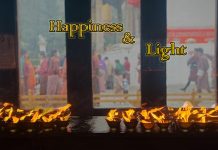
AFTER three years in the Covid wilderness, it is literally a breath of fresh air to be able to breathe in coastal Victoria’s salty air and drink in the sights and sounds of an eternally charming landscape.
Victoria’s mix of countryside, seaside and metropolitan offerings, complete with unpredictable weather, makes for an eclectic vacation, regardless the number of times you visit.
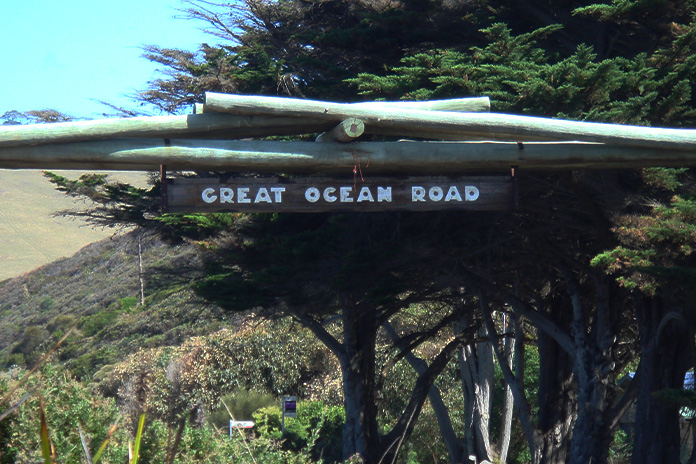
Coming from the city, the Great Ocean Road is often my go-to first stop. The further along you drive past the Memorial Arch, you feel the grip of the city loosening on you; tension and stress absorbed by the therapeutic beauty of the landscape. It’s only from a longer stay that you benefit from this in a significant way.
I always wonder at the tour buses that come through the small towns, disgorging selfie-snapping tourists who ooh and aah at the scenery and the shops before hopping back onto the buses that will fetch them to gawk at the 12 Apostles before rushing back to Melbourne.
Take your time. Rent a nice house with a view of the ocean and soak in the atmosphere.
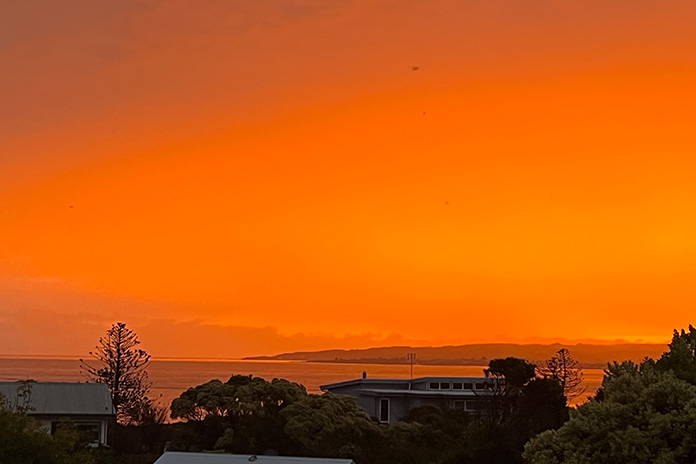
You’ll enjoy spectacular sunsets; the rhythmic sound of the waves rolling in will help you unwind, along with those delightful walks along quiet beaches.
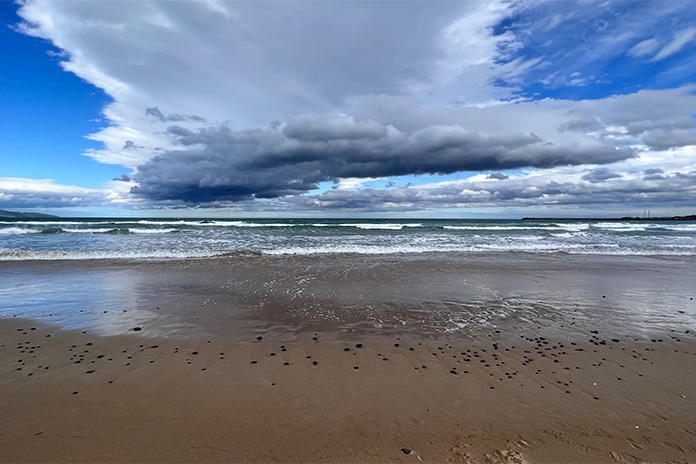
The long drive is worth it for the dramatic scenery en route, through charming coastal towns like Geelong, Lorne, Apollo Bay and Port Campbell, and, if you wish, further along to the Grampians. The Great Ocean Road runs for 240km from Torquay to Warrnambool.
Apollo Bay was an ideal base for the first half of my recent trip. The water views and the mix of activities presented a variety of options. If you give yourself enough time, you can take in the sights at leisure.
Cape Otway Lighthouse
Recently reopened, the Cape Otway Lighthouse kept the area safe for ships for 110 years. For close to 150 years, this “beacon of hope” guided many ships to safety along this stretch called “the shipwreck coast”. Overlooking the treacherous stretch of coast where the Bass Strait meets the Southern Ocean, this was the first sight of land for 19th century seafarers, which meant many boats headed for shore, only to wind up wrecked on the hidden rocks.
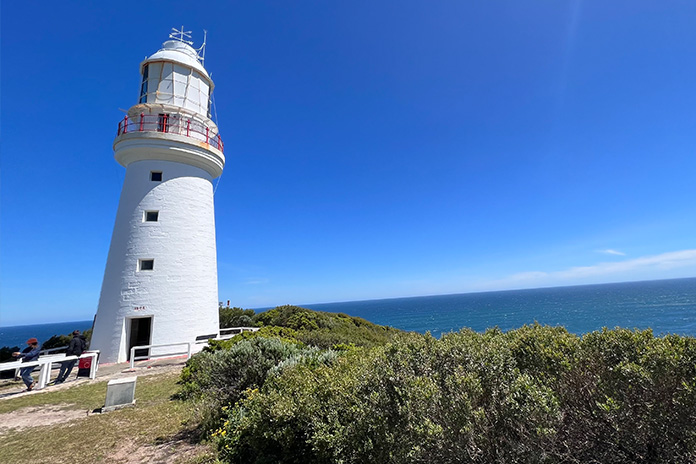
The lighthouse was completed in 1848 but was decommissioned as a result of technological advances in 1994, replaced by a solar powered beacon. But thisoldest surviving lighthouse on mainland Australia is still functioning as a tourist site. The buildings and installations on the grounds offer visitors a view into the past.
Getting to the top of the lighthouse involves a dizzying climb as you wind your way up. Once you reach the top, it’s just breathtaking views of the sea and the land. Be careful of strong winds that are eager to snatch at your phone.
Wildlife Wonders
A short drive out of Apollo Bay and you are navigating winding roads that lead you to Wildlife Wonders. Like many nature reserves, the main building is a low structure with a cafe, useful information, some specimens in captivity (for their own safety), and beyond which is a gentle walking trail.
Nature guide Simon Slieker walks us through the largely natural landscape at a leisurely pace. He stops to point out koalas — dark blobs on trees — and the rustling in the grass made by potoroos. A native of the Great Ocean Road, Simon listens to the familiar sounds, pointing to a pool of brown water or one of the 700 types of eucalyptus trees by way of explanation.
He stops along the track to pick up some pellets. Fresh koala poop, when split open, smells of eucalyptus. Now you know!
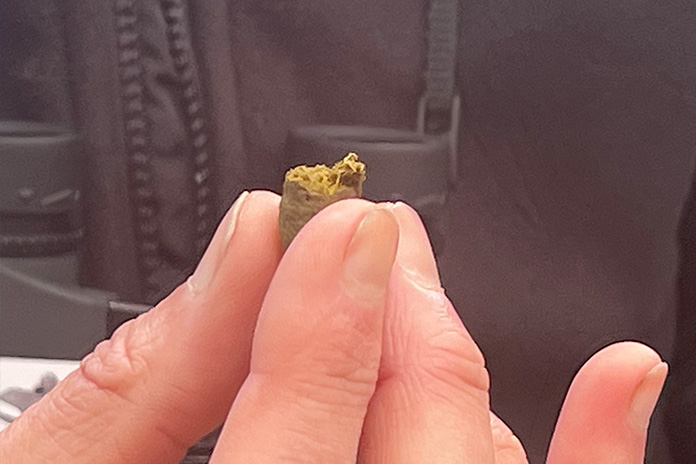
The walk takes us past stunning views of the ocean. On this rainy late spring day you can see the cloud formations and watch the rain come rolling in. And if you’re really lucky, you may spot a Southern Right whale. Kangaroos hop into view, unperturbed by the visitors and go about their regular routines.
6 Seasons Of Separation
Simon talks about how the Eastern Maar (an area of Victoria that includes the Great Ocean Road) people divide the year into six periods based on what is happening in the surrounding environment.
Larneuk is the season for nesting birds, from late July to August.
Petyan is the wildflower season from late August to mid-November.
Ballambar is the butterfly season, from mid-November to late January.
Kooyang is the season for eels, from late January to late March.
Gwangal moronn is the honeybee season running from late March to the end of May.
Chinnup is the season of cockatoos, from June to late July.
Maits Rest
The Great Otway National Park is a vast area, but you get to appreciate a microcosm of it at Maits Rest.
Here, towering trees stand their ground, and carnivorous snails can be found — flora and fauna that existed since the days of the dinosaurs. There’s a myrtle beech tree over 200 years old that’s made up of three trees growing together.
Marriners Lookout
A comfortable 10-minute uphill walk takes you to Marriners Lookout. This elevated spot gives you a good view of Apollo Bay and the surround areas, and is the place to be for a sunrise shot.
The track and lookout are on private property, so follow the instructions on the signage and leave with your trash.
12 Apostles From The Air
The 12 Apostles — only seven remain — are often the main draw, and they serve as magnificent sentinels that will eventually erode as they lose the battle with the ocean.
Some 7km out of Port Campbell, near the 12 Apostles Information centre, you’ll be drawn to the red helicopters fetching and ferrying eager tourists.
12 Apostles Helicopters offers a number of tours. A short 15-minute ride will take you to London Bridge, or opt for an hour-long flight to Cape Otway. This is a great way to take in the coastline of this scenic stretch of Victoria and you never tire of it.
In The City
Making up for lost time, Melbourne presents a charming mix of old and new architecture, great cuisines, theatre, sporting events, road works and traffic congestion. And if you’re driving, an opportunity to figure out the hook turn at tram line junctions!
And a word of warning about parking fees. In the city centre, parking is exorbitant. Parking in some locations can cost as much as A$65 for three hours of parking. Some shopping malls, like QV, let you get away with a $20 fee provided you spend at least $1 at any of their outlets.
TIME • RONE
One of the unexpected venues for an exhibition is the old Flinders Street station. Street artist turned established celebrity, Rone has spent the pandemic years creating a nostalgic tribute to mid-century post-WWII Melbourne.
Located on the third floor of the derelict railway station, the 12 installations that comprise TIME • RONE are created to project a time that is fading along with the Silent Generation (born between 1928–1945) and Baby Boomers (1946–1964).
Some original materials from the era are mixed with newly-made items aged in place for these installations.
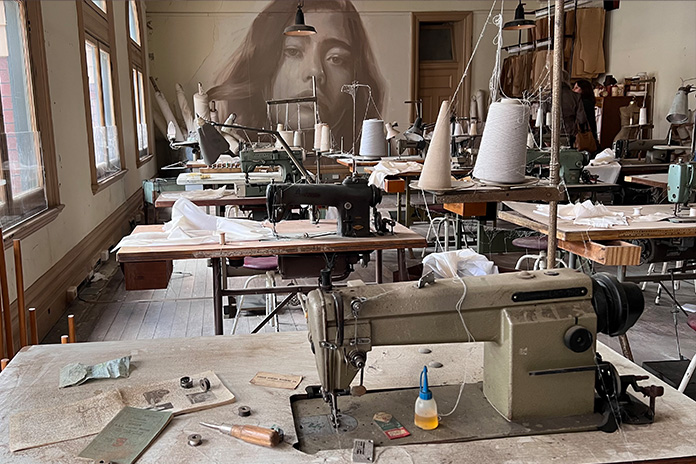
The rooms depict almost depressing scenes from the industrial era — a room full of sewing machines, a pharmacy, library, postal room, and a grand ballroom in a state of disrepair. Constant in all rooms is the image of the model and muse, Teresa Oman, who adds a splash of glamour amidst the dreariness. The melancholy and atmospheric soundtrack of Nick Batterham completes the mood.
Stunning, if you aren’t emotionally engulfed by the moment.
Monet & Friends, Lume Melbourne
The Lume Melbourne convention centre needs to improve its signage. Once you’ve found a parking spot, you are pretty much left to your own devices as to how you’ll find your way to the Monet & Friends exhibition. Head towards the Novotel Hotel which is next to the entrace of the exhibition.
Once you do get to the venue you’re immersed in art of Monet, Renoir, Sisley, Cézanne and company. The art is projected onto screens, walls and the floor, and you can stand or sit and take in the flashing images of daily life of 1860s France. Or you could sit in a Parisian-styled sidewalk cafe and have a latte while checking for messages on your mobile phone….

Harry Potter And The Cursed Child
The Harry Potter brand has made JK Rowling rich and famous. From books to movies about the young wizard, it has fans the world over. Bringing this production to the stage would have raised concerns about the limitations of watching a magical show onstage, when you’ve been treated to so much cinematic wizardry with the franchise.
The Princess Theatre fit the bill for the production, given its old-world charm and the willingness to fit out the place for the duration of the production — till the end of April 2023.
The magic and special effects are worth it. But, that said, the rest of the production was cursed by a bad plot, witless script and a stretched out production that stole more than three hours of your life that you’ll never get back. Such wizardry!
An Assortment Of Cuisines
Melbourne’s food options have always been worth savouring. Over the years, as international influences have absorbed by the city, the flavour palette has expanded.
This time around we checked out Hochi Mama, a bustling hot spot in the CBD, offering great Asian fare prepared with fresh produce. It’s also a sweet spot for a bite before a play.
Another lively joint is Do Dee Paidang in the basement of 353 Little Collins Street, serving up family-friendly Thai cuisine and live music that is drowned out by the loud families intent on their food.
Nomad on Flinders Lane presents more subterranean activity. The cuisine is Middle Eastern and Moroccan, with Spanish hues. A bit pricey for what you get, but the wood-fired flatbread is smashing, and generally, the appetisers overwhelm the mains.
But we were after a taste of the creations of the current darling of Melbourne’s culinary scene, Rosheen Kaul, who has transformed Etta with her daring cuisine.
The author of a new cookbook, Chinese-ish, the Singapore-born Rosheen has mixed Asian and Western influences with fresh produce in Etta’s offering. The results have seen the Brunswick East restaurant feeding a steady stream of customers.
The flavours are refreshing and nobody complains that there’s no beef on the menu (Rosheen doesn’t serve what she can’t eat).
It’s good to see that despite the repeated visits to Victoria, the attractions are still able to hold your attention and keep you engaged, regardless of circumstances or your evolving preferences.








